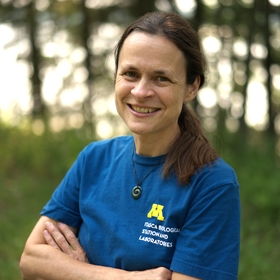

(Academic year) 226 Cargill
1500 Gortner Ave.
Saint Paul, MN 55108
United States
(summer) Itasca Biological Station and Laboratories
28131 University Circle
Lake Itasca, MN 56470
United States
Emily
Schilling
Emily provides administrative and programmatic leadership for the Itasca Station. She leads the Field Biology Program, guiding curricular decisions and student experiences in Itasca's living-learning community. She develops strategies for the station to foster diversity, equity and inclusion in the field and leads scientific outreach and engagement efforts with Itasca State Park. She works with university and community stakeholders to develop programming that enhances research opportunities, student experiences, and regional connections with Itasca. And, she works with the Station Scientist to coordinate research at the station and conducts her own aquatic ecology research.
Research statement
The overarching goal of my research is to address gaps in our understanding of how freshwater ecosystems function in natural and human-altered landscapes and to generate data that informs conservation and management strategies for protecting freshwater biodiversity. I focus on macroinvertebrates inhabiting naturally fish-free lentic habitats, with a particular interest in dragonflies, which are top predators in these unique freshwater ecosystems. I study biogeographic factors that influence dragonfly species distributions, their migratory behaviors and pathways, and the impacts of climate change on their phenology and geographic distributions.
Selected publications
Larson, D.M., D. DeJong, M.J. Anteau, M. Fitzpatrick, B. Keith, E.G. Schilling, and B. Thoele. 2022. High abundance of a single taxon (amphipods) predicts aquatic macrophyte biodiversity in prairie wetlands. Biodiversity and Conservation. 31:1073-1093. https://doi.org/10.1007/s10531-022-02379-9
Schilling, E.G., K.J. Kardynal, H. Kundel, Z. Crews-Erjavec, J.M. Zobitz, and K.A. Hobson. 2021. Phenological and isotopic evidence for migration as a life history strategy in Aeshna canadensis (family: Aeshnidae) dragonflies. Ecological Entomology. 46:209-219. https://doi.org/10.1111/een.12953
Hornbach, D.J., E.G. Schilling, and H. Kundel. 2020. Ecosystem metabolism in small ponds: the effects of floating-leaved macrophytes. Water. Special issue: Biodiversity and Functionality in Freshwater Transitional Ecosystems. 12:1458. https://doi.org/10.3390/w12051458
Schilling, E.G., R., Lawrenz, and H. Kundel. 2019. An assessment of the geographic distribution and status of a rare dragonfly, Rhionaeschna mutata, at the northwestern edge of its range. Northeastern Naturalist. 26:523-536. https://doi.org/10.1656/045.026.0305
Schilling, E.G., R. Lawrenz, and H. Kundel. 2019. A review of the reproductive habitat preferences and conservation challenges of a rare, transient, and ecologically restricted darner dragonfly: Rhionaeschna mutata. International Journal of Odonatology. 22:1-9. https://doi.org/10.1080/13887890.2018.1554513
Anthony, J., J. Baccam, I. Bier, E. Gregg, L. Halverson, R. Mulcahy, E. Okanla, S.A. Osman, A.R. Pancoast, K.C. Schultz, A. Sushko, J. Vorarath, Y. Vue, A. Wagner, E.G. Schilling, and J.M. Zobitz. 2018. Modeling mayfly larvae length distribution and population dynamics across a gradient of stream temperatures and stream types. Spora: A Journal of Biomathematics. 4:1-14.
Education and background
- Ph.D., Ecology & Environmental Sciences, University of Maine, 2008
- M.S., Ecology and Environmental Sciences, University of Maine, 2002
- B.A., Biology and French, Magna Cum Laude, Colgate University, 1997